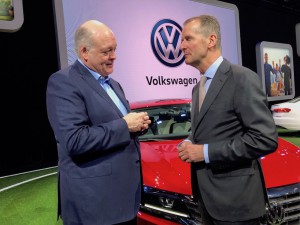
Ford Motor Co. CEO Jim Hackett, left, and Volkswagen AG CEO Herbert Diess talk on the floor of the Detroit Auto Show today.
Volkswagen and Ford have effectively locked down the details of a major new alliance that will see them work together on the development of autonomous and electrified vehicles.
The two automakers launched a joint venture in January focused on commercial vehicles and, at the time, confirmed they would look at other opportunities, including electric and self-driving vehicles. According to Reuters, the German automaker’s supervisory board is expected to consider the deal when it meets later this week, with Ford’s board of directors also expected to weigh in shortly. Sources have confirmed that scenario to TheDetroitBureau.com, as well.
Officially, the two automakers continue to say only that talks are proceeding. It is not clear when a formal announcement will be made.
Ford was an early player in the battery-car field with vehicles like the Focus Electric, a limited-range battery-electric vehicle, and the C-Max Energi, a plug-in hybrid. But it has lagged behind in recent years and is only now preparing to reveal its first long-range BEV later this year, with a goal of investing $11 billion in battery-car technology.
(Ford, Volkswagen Nearing Second Agreement)
For its part, Volkswagen was relatively slow to enter the field, long preferring to focus on diesel power. Since its emissions scandal broke in 2015, however, it has shifted focus and is now planning to roll out nearly 50 all-electric models by mid-decade, along with conventional and plug-in hybrids.
The joint electrification project ran into some initial problems, Jim Farley, Ford’s president of new business and technology, told TheDetroitBureau.com several months ago, with the timing of the Ford and VW programs out of sync in terms of timing. It is not yet clear how the two companies have decided to resolve that.
But insiders say that part of the deal will see Volkswagen provide Ford with access to its MEB architecture, the platform that will underlie most of its future battery-electric vehicles – with the exception of more up-market products sold by luxury brands such as Audi and Porsche. Most of those will use a separate and more sophisticated platform.
(Ford, VW Announce 1st in Promised Series of Joint Ventures)
Separately, the two manufacturers will pool resources to bring self-driving vehicles together. Both see autonomous technology as critical to the future of the auto industry. What is uncertain is how they plan to focus their joint efforts. For its part, Ford has been focusing on more advanced, driverless systems – Levels 4 and 5, in industry-speak – that would primarily be used by commercial fleets, whether for delivery or ride-sharing vehicles.
An alliance between the two companies would come at a time when automakers around the world are partnering up in a bid to reduce the massive costs associated with the development of the technologies expected to dominate the auto industry over the coming decades. According to a study released by consultancy AlixPartners last month, manufacturers will invest a collective $225 billion in electrification between 2019 and 2023, while spending on self-driving vehicle efforts will rise to around $85 billion annually by 2025.
Last week, Jaguar Land Rover announced it will invest about $1.3 billion to start producing electric vehicles at its Castle Bromwich plant, starting with a BEV version of the XJ, its flagship sedan. That news came barely a month after the British-based automaker said it would team up with erstwhile competitor BMW to share battery-car development efforts.
(BMW, Jaguar Land Rover Team Up on Next-Gen Battery-Drive Technology)
But such alliances tend not to be monogamous. The Bavarian automaker this month said it was expanding its ties with luxury rival Daimler AG, the parent of Mercedes-Benz focused on autonomous vehicle and mobility services.
